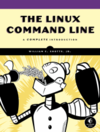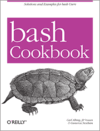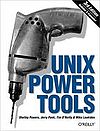HPC/Linux Guides: Difference between revisions
< HPC
Jump to navigation
Jump to search
mNo edit summary |
mNo edit summary |
||
| Line 1: | Line 1: | ||
To use ''Carbon'' and other HPC systems, you will need to become familiar with Unix/Linux conocepts. | |||
You will be navigating directories, create, view, and edit files, and run commands on a ''shell'' command line. | |||
As you become comfortable and learn about more commands and shell features, you will find that you will work increasingly efficiently. | |||
There are numerous resources to get you started, and some are shown below. Free web pages and PDFs provide the extremes of coverage and style – both short introductions and good reference materials, but for the purpose of active learning it will be best to purchase a book in print or ebook form, or attend an instructor-led class. | |||
== Beginners == | == Beginners == | ||
[[Image:HPC 2012-02-04 Book cover small - The Linux Command Line.png|100px|right]] | [[Image:HPC 2012-02-04 Book cover small - The Linux Command Line.png|100px|right]] | ||
| Line 8: | Line 14: | ||
; [http://vic.gedris.org/Manual-ShellIntro/1.2/ShellIntro.pdf Introduction to the Linux Command Shell For Beginners (pdf)]: | ; [http://vic.gedris.org/Manual-ShellIntro/1.2/ShellIntro.pdf Introduction to the Linux Command Shell For Beginners (pdf)]: | ||
: Provides a "fast and simple introduction to using the Linux command shell and some of its basic utilities. Assumes very little or even no prior exposure to the Linux command prompt. References to DOS commands are made where appropriate. This document was meant to accompany an instructor-led tutorial on this subject, and therefore some details have been left out." | : Provides a "fast and simple introduction to using the Linux command shell and some of its basic utilities. Assumes very little or even no prior exposure to the Linux command prompt. References to DOS commands are made where appropriate. This document was meant to accompany an instructor-led tutorial on this subject, and therefore some details have been left out." | ||
: Very short, but does cover the basics of managing files and directories, and key concepts like pipes | : Very short, but does cover the basics of managing files and directories, and touches on key concepts like redirections and pipes. --[[User:Stern|stern]] | ||
; [http://www.gnu.org/software/bash/manual/ Bash Reference Manual]: | ; [http://www.gnu.org/software/bash/manual/ Bash Reference Manual]: | ||
: "A brief introduction to features found in Bash." For a definitive reference on shell behavior please review the Bash manual page. | : "A brief introduction to features found in Bash." For a definitive reference on shell behavior please review the Bash manual page. | ||
| Line 15: | Line 21: | ||
== Intermediate == | == Intermediate == | ||
; <code>man bash</code>: | |||
: The Bash manual page is the definitive resource on capabilities and syntax. Covers all details of bash precisely and concisely. The man command as shown gives the version relevant for your current system. See http://bashcookbook.com/bashinfo/#bash for other versions. Simple scripting concepts are applicable for all versions, but more recent ones add capabilities to make scripting more flexible, such as regular expression matching, array variables, and arithmetic loops. --[[User:Stern|stern]] | |||
[[Image:HPC 2012-02-04 Book cover small - bash Cookbook.gif|100px|right]] | [[Image:HPC 2012-02-04 Book cover small - bash Cookbook.gif|100px|right]] | ||
; [http://oreilly.com/catalog/bashckbk/ bash Cookbook – Solutions and Examples for bash Users]: | ; [http://oreilly.com/catalog/bashckbk/ bash Cookbook – Solutions and Examples for bash Users]: | ||
:* By Carl Albing, JP Vossen, Cameron Newham; O'Reilly, May 2007; about $30–$50. | :* By Carl Albing, JP Vossen, Cameron Newham; O'Reilly, May 2007; about $30–$50. | ||
:* related materials at http://bashcookbook.com/ | :* related materials at http://bashcookbook.com/ | ||
== Advanced == | == Advanced == | ||
Revision as of 22:58, February 4, 2012
To use Carbon and other HPC systems, you will need to become familiar with Unix/Linux conocepts. You will be navigating directories, create, view, and edit files, and run commands on a shell command line. As you become comfortable and learn about more commands and shell features, you will find that you will work increasingly efficiently.
There are numerous resources to get you started, and some are shown below. Free web pages and PDFs provide the extremes of coverage and style – both short introductions and good reference materials, but for the purpose of active learning it will be best to purchase a book in print or ebook form, or attend an instructor-led class.
Beginners
- The Linux Command Line – A Complete Introduction
-
- By William E. Shotts Jr.; No Starch Press, January 2012; about $30 – $40 in print or as ebook.
- Fairly gentle tutorial introducing Linux in general and command line usage in particular. --stern
- Guide to Unix Computing (Wikibook), section Shell Prompt
- "… describes Unix and Unix-like systems for users and system administrators. We include a guide to commands which lists several of the common shell commands."
- Introduction to the Linux Command Shell For Beginners (pdf)
- Provides a "fast and simple introduction to using the Linux command shell and some of its basic utilities. Assumes very little or even no prior exposure to the Linux command prompt. References to DOS commands are made where appropriate. This document was meant to accompany an instructor-led tutorial on this subject, and therefore some details have been left out."
- Very short, but does cover the basics of managing files and directories, and touches on key concepts like redirections and pipes. --stern
- Bash Reference Manual
- "A brief introduction to features found in Bash." For a definitive reference on shell behavior please review the Bash manual page.
- The Bash Guide for Beginners
- "Gets you started with Bash scripting…. Everybody who wants to make life easier on themselves, power users and sysadmins alike, can benefit from reading this practical course. The guide contains lots of examples and exercises at the end of each chapter, demonstrating the theory and helping you practice."
Intermediate
man bash- The Bash manual page is the definitive resource on capabilities and syntax. Covers all details of bash precisely and concisely. The man command as shown gives the version relevant for your current system. See http://bashcookbook.com/bashinfo/#bash for other versions. Simple scripting concepts are applicable for all versions, but more recent ones add capabilities to make scripting more flexible, such as regular expression matching, array variables, and arithmetic loops. --stern
- bash Cookbook – Solutions and Examples for bash Users
-
- By Carl Albing, JP Vossen, Cameron Newham; O'Reilly, May 2007; about $30–$50.
- related materials at http://bashcookbook.com/
Advanced
- Advanced Bash-Scripting Guide
- "This document is both a tutorial and a reference on shell scripting with Bash. It assumes no previous knowledge of scripting or programming, but progresses rapidly toward an intermediate/advanced level of instruction. The exercises and heavily-commented examples invite active reader participation."
- Unix Power Tools, Third Edition
-
- By Jerry Peek, Shelley Powers, Tim O'Reilly, Mike Loukides; O'Reilly, 2002. About $40–$70 in print or as ebook.
- The Comprehensive List of bash Reference Documentation and Examples
- Various documentation resources, sources, snippets, metadata across multiple versions (from the bash Cookbook wiki).


